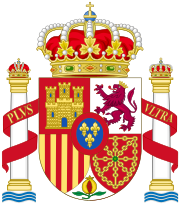
Back قانون الذاكرة التاريخية Arabic Llei de Memòria Històrica Catalan Ley de Memoria Histórica German Ley de Memoria Histórica de España Spanish Espainiako Oroimen Historikoaren Legea Basque Loi sur la mémoire historique French Lei de memoria histórica de España Galician Legge sulla memoria storica Italian Ley de Memoria Histórica Dutch Prawo Pamięci Historycznej (Hiszpania) Polish

 |
|---|
Law 52/2007, commonly known as Historical Memory Law (Sp: Ley de Memoria Histórica), recognises and broadens "the rights and establishes measures in favour of those who suffered persecution or violence during the civil war and the dictatorship."[n 1] It was passed by the Congress of Deputies on 31 October 2007,[1] on the basis of a bill proposed by the PSOE government of Prime Minister José Luis Rodríguez Zapatero. The Historical Memory Law principally recognizes the victims on both sides of the Spanish Civil War, gives rights to the victims and the descendants of victims of the Civil War and of the subsequent dictatorship, and formally condemns the repressions of the Franco regime.
The conservative Popular Party and the Republican Left of Catalonia (ERC) both voted against the law, for opposite reasons.[2] For its vote, the Popular Party accused the Socialist Party government of weakening the political consensus of the transition to democracy and "using the Civil War as an argument for political propaganda", while the Republican Left of Catalonia rejected the law on the basis that it did not go far enough.[3][4]
Cite error: There are <ref group=n> tags on this page, but the references will not show without a {{reflist|group=n}} template (see the help page).
- ^ Cué, Carlos E. (31 October 2007). "La ley de memoria se aprueba entre aplausos de invitados antifranquistas". El País – via elpais.com.
- ^ Cite error: The named reference
thinkspainwas invoked but never defined (see the help page). - ^ Cite error: The named reference
typicallywas invoked but never defined (see the help page). - ^ Hamilos, Paul (10 October 2007). "Spanish MPs to vote on law recognising Franco's victims". The Guardian. London.